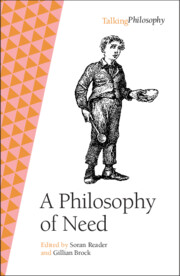Book contents
- A Philosophy of Need
- Talking Philosophy
- A Philosophy of Need
- Copyright page
- Contents
- List of Contributors
- Foreword
- Introduction
- 1 An Idea We Cannot Do Without: What Difference Will It Make (eg. to Moral, Political and Environmental Philosophy) to Recognize and Put to Use a Substantial Conception of Need?
- 2 Needs and Global Justice
- 3 Need, Humiliation and Independence
- 4 Needs and Ethics in Ancient Philosophy
- 5 Aristotle on Necessities and Needs
- 6 Need, Care and Obligation
- 7 Needs, Facts, Goodness, and Truth
- 8 Fundamental Needs
- 9 Needs, Rights, and Collective Obligations
- 10 Where Does the Moral Force of the Concept of Needs Reside and When?
- 11 Needs and Capabilities
- Index
3 - Need, Humiliation and Independence
Published online by Cambridge University Press: 25 April 2024
- A Philosophy of Need
- Talking Philosophy
- A Philosophy of Need
- Copyright page
- Contents
- List of Contributors
- Foreword
- Introduction
- 1 An Idea We Cannot Do Without: What Difference Will It Make (eg. to Moral, Political and Environmental Philosophy) to Recognize and Put to Use a Substantial Conception of Need?
- 2 Needs and Global Justice
- 3 Need, Humiliation and Independence
- 4 Needs and Ethics in Ancient Philosophy
- 5 Aristotle on Necessities and Needs
- 6 Need, Care and Obligation
- 7 Needs, Facts, Goodness, and Truth
- 8 Fundamental Needs
- 9 Needs, Rights, and Collective Obligations
- 10 Where Does the Moral Force of the Concept of Needs Reside and When?
- 11 Needs and Capabilities
- Index
Summary
The needs principle—that certain goods should be distributed according to need—has been central to much socialist and egalitarian thought. It is the principle which Marx famously takes to be that which is to govern the distribution of goods in the higher phase of communism. The principle is one that Marx himself took from the Blanquists. It had wider currency in the radical traditions of the nineteenth century. In the twentieth century it remained central to the mutualist form of socialism defended by Tawney and Titmuss. The principle underlay the development and justification of the modern welfare state—thus the National Health Service is still founded upon the idea that the distribution of medical resources should be determined by medical need, not by ability to pay. One source of the power of the needs principle lies in the fact that it appears to be both a principle of justice and a principle of community or social solidarity. As a principle of justice it is offered as a corrective to the particular forms of unequal distributions of goods that can result from market transactions, and as a principle of community or social solidarity as a corrective to the possessive individualism taken to be the corollary of a market order.
- Type
- Chapter
- Information
- A Philosophy of Need , pp. 110 - 147Publisher: Cambridge University PressPrint publication year: 2024

